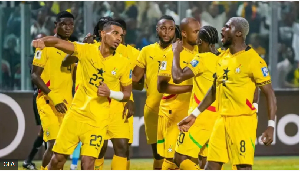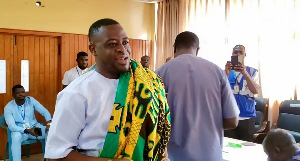Sunyani (B/A), Jan. 8, GNA - Nana Owusu-Nsiah, the Inspector-General of Police (IGP), on Friday reminded Ghanaians that the current democratic dispensation in the country, did not allow any citizen to show disrespect for the Presidency.
He said:"The democratic dispensation in the country does not arrogate any power to any citizen to say any unholy thing against the President, who is the political father of the land".
Nana Owusu-Nsiah was addressing senior police officers, representatives of political parties, religious bodies, the media and other stakeholders in Sunyani as part of a working visit to the Brong-Ahafo Region.
He advised political party executives to respect the laws of the country, especially the Public Order Act and to be mindful of their utterances during their electioneering campaigns to preserve the country's peace and stability.
The IGP reminded the public that Section 183A of the Criminal Code Act 29 spelt out that: "Any person who, with intent to bring the President into hatred, ridicule or contempt, publishes any defamatory or insulting matter whether by writing, print, word or mouth or any other manner whatsoever concerning the President shall be guilty of an offence and liable on summary conviction to a fine or to imprisonment not exceeding three years or to both".
Nana Owusu-Nsiah said, notwithstanding, the clear-cut interpretation of the Act, the Police had been very cautious in applying the law with the expectation that the public would take note of the Biblical advice that "we should give due respect to our fathers and mothers".
Nana Owusu-Nsiah commended the media for discharging their traditional role of watchdog of the society, but noted that some print media published "bare facts that hit below the belt" for commercial gains.
The IGP advised editors of newspapers to ensure that sensational stories were not published since according to him such cheap and unguarded publications contributed to unrests in Liberia, Rwanda, Nigeria, Cote d'Ivoire and other parts of Africa that resulted in the maiming and killing of innocent citizens, some of whom resided in neighbouring countries as refugees.
Nana Owusu-Nsiah noted that: "the pen is mightier than the sword" and explained that the sword could be dangerous at short intervals and so was the A.K. 47 assault rifle.
He said the power of the pen could be more devastating because a publication could reach any part of the world, especially now that Ghana had joined the global age with most news items about the country on the Internet.
The IGP advised the media to be circumspect in their reportage to avoid antagonism, particularly during this year's electioneering campaign.
Nana Owusu-Nsiah announced during a forum also at Sunyani that the Police Administration was collaborating with the Ministry of Transport and Communication to institute on the spot fine against drivers arrested for traffic offences.
He was responding to a question by the Reverend Father Kwame Kumi of the Sunyani Catholic Diocese as to why the Motor Transport and Traffic Unit (MTTU) of the Police was not operating spot fines against offending drivers to curtail unnecessary delay of such cases at the courts.
Rev. Kumi said Cote d'Ivoire and United States of America for instance impose on the spot fines for over-speeding, over-loading, processing of non-regularized driving documents and others traffic offences.
He, however, stressed that "it is only when the Ghanaian police personnel becomes self-sufficient that he or she will be fair and disciplined" and suggested part of the fines could be given to the police administration.
Nana Owusu-Nsiah said the mechanism by which the police would work alongside a representative of a different organization or an institution in the collection of the fines and issuance of receipts was being worked out.
He said the Government had already taken note of the need for the spot fine and some personnel were being trained towards the implementation of the scheme.
The IGP said among the modalities of the imposition of the fine would be that 50 per cent or more of the fine would go into the coffers of the Police Administration.
Nana Owusu-Nsiah asked the public to bear with the Police Service in respect of its problems, saying police personnel number between 15,000 and 16,000 and are expected to cater for about 20 million Ghanaians.
He said in view of the limited number of personnel, the police administration had contracted some informants to help the police perform its work.
Nana Owusu-Nsiah commended the informants for working effectively with the police leading to the arrest of armed robbers and other criminals.
The IGP said the government had given approval for the recruitment of 2,000 personnel into the Police every year, adding that last year 1,900 people were recruited to beef up 500 who were already in training. He said the police administration was doing everything possible to get rented accommodation for the newly engaged police personnel posted to parts of the country and appealed to politicians, landlords and others to help in this direction.
Nana Owusu-Nsiah expressed regret that the acute accommodation problem facing the Service had compelled four policemen to share a room in some police barracks.
He noted that there were persistent public criticism of the police and said, "The Police will be efficient if society becomes honest" in dealing with them.
General News of Sunday, 8 February 2004
Source: GNA
Democracy do not allow disrespect for Presidency -IGP
Entertainment











